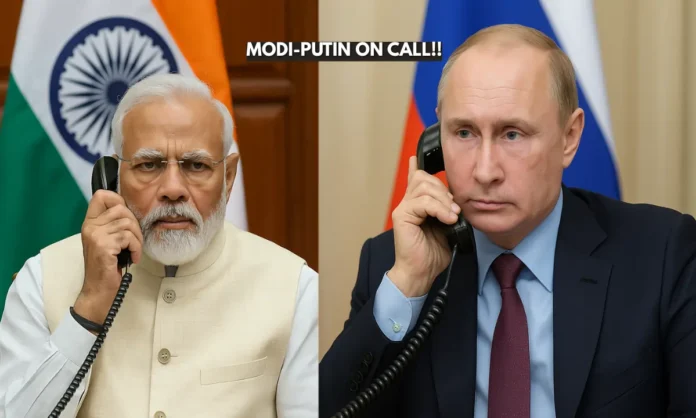Summary
- The PM Modi Putin phone call on August 8, 2025, reaffirmed India–Russia strategic ties during heightened U.S. tariff tensions.
- Modi thanked Putin for updates on Ukraine, invited him to India for the annual summit, and pledged to deepen their “Special and Privileged Strategic Partnership.”
- The call reflects India’s commitment to strategic autonomy as U.S. tariffs reach 50% over Russian oil imports.
Setting the Stage
As global trade tensions escalate, the PM Modi Putin phone call signals New Delhi’s determination to safeguard strategic autonomy. On August 8, 2025, Prime Minister Narendra Modi reached out to Russian President Vladimir Putin. He thanked him for briefing on Ukraine, invited him to this year’s India–Russia annual summit, and together reaffirmed their intent to deepen the “Special and Privileged Strategic Partnership.” This exchange came amid U.S. President Trump raising tariffs on Indian goods to a staggering 50%, particularly targeting India’s purchases of Russian oil.
🇷🇺🇮🇳 PM Modi says he had a 'very good and detailed' call with President Putin
— RT (@RT_com) August 8, 2025
THANKED him for the Ukraine update. Both sides reaffirmed their commitment to deepen the India-Russia Strategic Partnership
Putin expected in India later this year https://t.co/i8CO8HQry7 pic.twitter.com/WYIxpb4Ldx
Underreported Signals
- The PM Modi Putin phone call came just after India’s National Security Adviser Ajit Doval met Russia’s top security official in Moscow, reinforcing the continuity of high-level dialogue.
- The call underscored India’s balancing act: continuing defense and energy ties with Russia while navigating a strained U.S. relationship.
India’s reliance on Russian oil—accounting for roughly 35% of its total crude imports—makes Moscow a key energy partner. India has also historically depended on Russian defense hardware and energy supplies. The call serves as a reaffirmation that these long-standing relationships remain central to India’s strategic calculus.
The Pressure from the U.S.
- The PM Modi Putin phone call occurs at a moment when U.S.–India relations are under severe strain. Trump’s punitive tariffs, now at 50%, have disrupted years of cooperation.
- India’s post-call statement was clear: these tariffs are “unfair, unjustified and unreasonable,” especially when other major buyers of Russian oil face no such penalties.
Observers note that the call is part of a realignment in India’s foreign policy. Modi’s emphasis on shared strategic interests with Russia reflects a shift away from over-reliance on the U.S., re-grounding ties with traditional partners and strengthening other international linkages.
Strategic Implications
India’s defense relationship with Russia remains strong—over two-thirds of its defense imports in recent years have come from Moscow, including advanced systems like the S-400 air defense missiles and BrahMos cruise missiles. Economic integration covers oil, fertilizers, nuclear energy, and technology—illustrating a partnership that extends beyond simple trade.
The PM Modi Putin phone call signals that these partnerships will not be abandoned under external pressure. By inviting Putin to India later this year, Modi aims to advance cooperation in infrastructure, energy, and defense, ensuring continuity in areas critical to India’s national security.
What Lies Ahead
- The PM Modi Putin phone call is expected to set the tone for a deeper bilateral agenda, potentially resulting in significant agreements during Putin’s upcoming visit.
- India is doubling down on its “multi-alignment” strategy, engaging with multiple powers instead of aligning exclusively with any one bloc.
Over the coming weeks, India may adapt its trade strategies, diversify its energy suppliers, and accelerate defense self-reliance programs. This approach ensures that national interests remain protected even in the face of disruptive trade measures. While tensions with the U.S. could ease if negotiations are reopened, India’s current trajectory suggests it will continue strengthening ties with Russia and other non-Western partners.
Final Thought
India’s foreign policy philosophy emphasizes sovereignty and strategic autonomy. The PM Modi Putin phone call stands as a testament to that principle—projecting a message that New Delhi will continue charting its own path in global affairs. While tariffs from Washington may cause short-term disruptions, India’s response is to lean on its historic alliances and broaden its diplomatic network, ensuring long-term resilience in an unpredictable global order.


